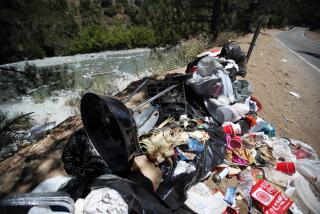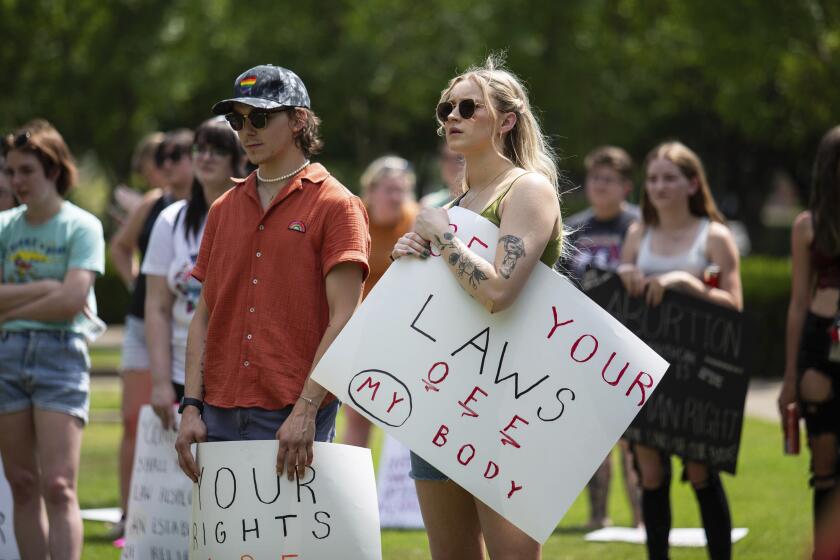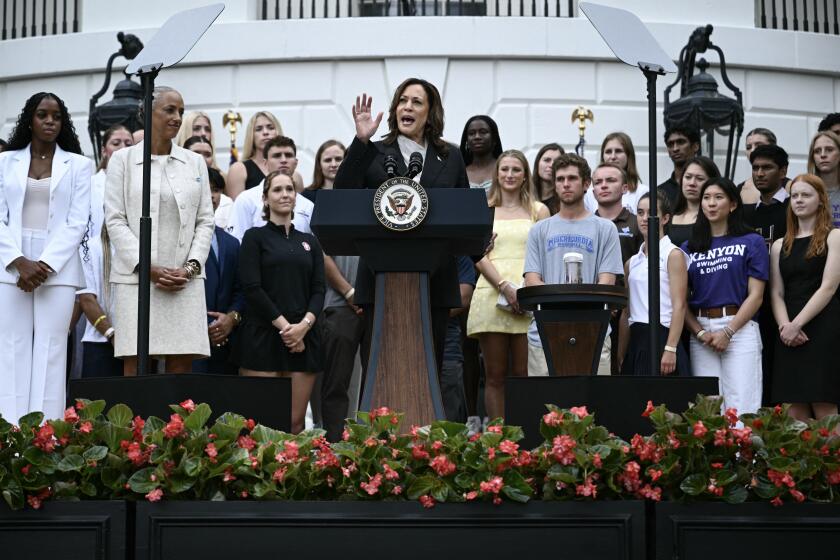2008 year in review
Last Sunday, New Yorkers gathered in Times Square for the second annual Good Riddance Day, feeding reminders of the things they least liked about 2008 into an industrial-sized paper shredder. There’s something so wonderfully archetypal about this ritual -- the only reason James George Frazer didn’t mention it in “The Golden Bough” was that the ancient Celts didn’t have giant shredders -- that we can’t help but hope the tradition catches on. Heaven knows, there is a big pile of news from the previous year that we’d like to shred.
The year 1992 might have been the British royal family’s “annus horribilis,” as Queen Elizabeth II declared after parts of Windsor Castle and her children’s marriages turned to ashes, but for the less blue-blooded, it’s likely that 2008 will be considered the most horrible year in recent memory. Yet as dark as things got last year, and as creeping the presentiments that things could get even darker in 2009, the year also was characterized by events of such startling brightness that the way through the tunnel seems clear. We’re confident that when the state and the nation emerge from their current economic dark times, they’ll be better off than when they entered.
Above all, 2008 was a year of loss. Lives were lost by the thousands in tragic and unnecessary attacks and accidents, such as the Mumbai terrorist assault in November and the deadly Metrolink crash in Chatsworth in September. But the most widespread losses were financial. Retirement savings were wiped out overnight, homes were foreclosed on, and jobs and livelihoods were ripped away in an ever-widening recession that started with irresponsible mortgage lenders and borrowers and ended by hurting nearly everyone.
It’s hardly surprising that New Yorkers spent Sunday shredding mainly financial documents -- 401(k) reports, bills, account statements. Other common articles consigned to oblivion included pieces of paper with names written on them, especially one particular name: George W. Bush.
Frazer would have had little trouble recognizing this phenomenon; since before the dawn of history, communities have heaped the blame for every ill that befell them over the previous year on a single figure -- the scapegoat -- then burned him in effigy, banished him or even sacrificed him. Like scapegoats of old, President Bush is hardly responsible for all the woes piled at his doorstep. Yet his shortsighted policies on energy and the environment, his illegal or irrational overreaching in the war on terror and his failure to regulate a financial system floating on a bubble of too-easy credit contributed heavily to many of our most serious problems.
As long as we’re feeding names into the shredder, there are many others to add from a year marked by political scandals. Former New York Gov. Eliot Spitzer, Illinois Gov. Rod R. Blagojevich, former North Carolina Sen. John Edwards, former Detroit Mayor Kwame M. Kilpatrick and former Alaska Sen. Ted Stevens lead a parade of corrupt or simply testosterone-addled politicians who torpedoed their own careers in 2008 and brought down a measure of public trust with them.
Around the globe, the usual troubles -- endless bloodshed between Palestinians and Israelis, fighting between U.S. soldiers and insurgents in Afghanistan, the meltdown of anarchic African countries such as Somalia and Congo -- mostly got worse. Simmering tensions between Russia and Georgia blew up into a short-lived invasion. Zimbabwe, once a breadbasket, is now in danger of becoming a failed state. The economic downturn is hurting the rest of the world as badly as, if not worse than, the United States.
Here in California, meanwhile, an income shortfall has paralyzed the Legislature and left it pondering multibillion-dollar cuts to schools and healthcare systems as well as huge tax increases. Another siege of flames hit the Southland this fall in what seems to be becoming an annual catastrophe.
So what could possibly balance out these horror-show headlines? For all the mistakes made by voters and their elected officials, in 2008 they also proved they could adapt to worsening conditions. It was a year of historic change that raises high hopes that the future will be better than the present.
Barack Obama is far more than just the country’s first African American president-elect. His background and recent Cabinet appointments show him to be a thoughtful leader who will make decisions based on facts rather than ideology, and who will consider a full range of opinions and options before acting. That all but guarantees he will make better choices than Bush. His popularity also will allow him to navigate choppy political waters in which Bush foundered, meaning it will be easier for him to get things done.
Like Obama’s election, many of 2008’s most important actions didn’t pay off immediately, but they will down the road. Iraq and the U.S. approved an agreement that will end our military presence there in 2011. The Supreme Court ruled that those held at Guantanamo Bay have a right to challenge their detention in federal court. And soaring gasoline prices caused demand to drop, SUV sales to plummet and Congress at the close of 2007 to impose tougher fuel-economy standards, even as business-as-usual Republicans were voted out in droves and lawmakers were put in position to implement smart new policies on renewable energy and carbon controls. In California, the state passed important rules that will clean the air of deadly diesel emissions and other pollution, and it made great strides toward ridding consumer products and factories of toxic substances.
In Los Angeles, voters passed Measure A, a sales-tax hike that eventually will help turn a dysfunctional public-transit system into a functional one. And the Writers Guild of America ended its strike after 100 days, allowing the TV industry to resume production and minimizing the damage to film shoots; the pain felt all around, it is hoped, should discourage the Screen Actors Guild and the major Hollywood studios from letting another walkout happen.
The thing we’d most like to throw into the big 2008 shredder is pessimism. We’ve seen better years, but times are changing.
More to Read
A cure for the common opinion
Get thought-provoking perspectives with our weekly newsletter.
You may occasionally receive promotional content from the Los Angeles Times.






